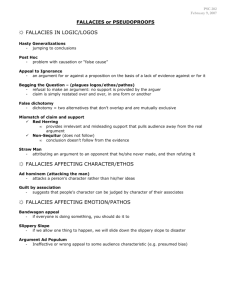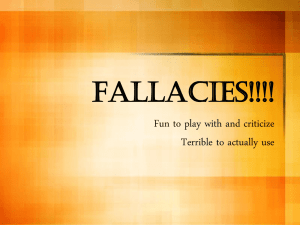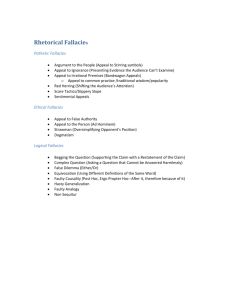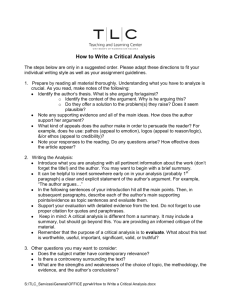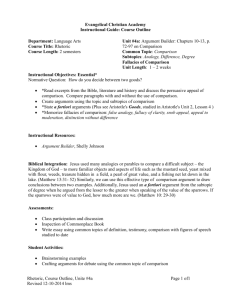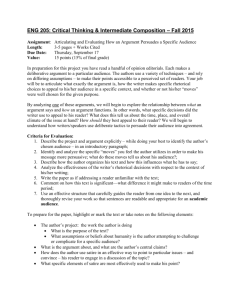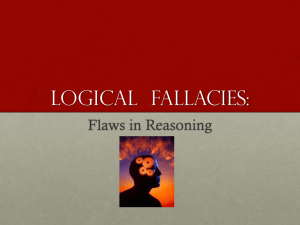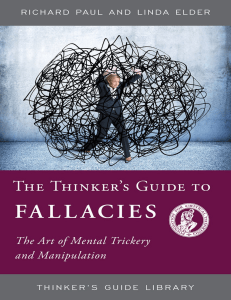File
advertisement
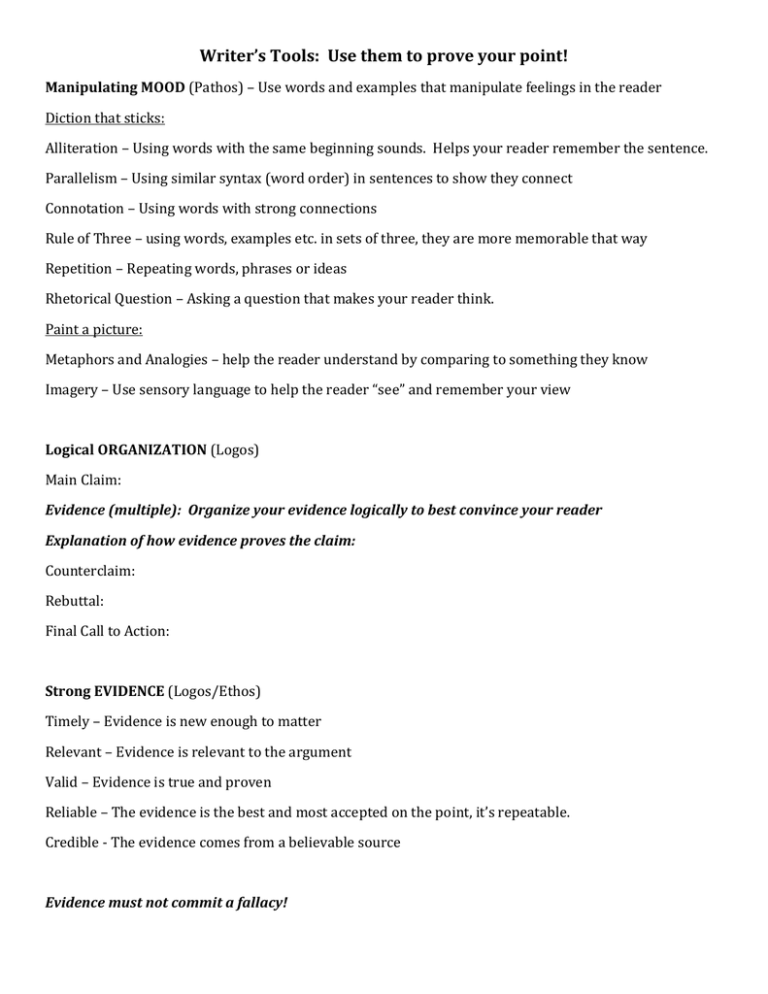
Writer’s Tools: Use them to prove your point! Manipulating MOOD (Pathos) – Use words and examples that manipulate feelings in the reader Diction that sticks: Alliteration – Using words with the same beginning sounds. Helps your reader remember the sentence. Parallelism – Using similar syntax (word order) in sentences to show they connect Connotation – Using words with strong connections Rule of Three – using words, examples etc. in sets of three, they are more memorable that way Repetition – Repeating words, phrases or ideas Rhetorical Question – Asking a question that makes your reader think. Paint a picture: Metaphors and Analogies – help the reader understand by comparing to something they know Imagery – Use sensory language to help the reader “see” and remember your view Logical ORGANIZATION (Logos) Main Claim: Evidence (multiple): Organize your evidence logically to best convince your reader Explanation of how evidence proves the claim: Counterclaim: Rebuttal: Final Call to Action: Strong EVIDENCE (Logos/Ethos) Timely – Evidence is new enough to matter Relevant – Evidence is relevant to the argument Valid – Evidence is true and proven Reliable – The evidence is the best and most accepted on the point, it’s repeatable. Credible - The evidence comes from a believable source Evidence must not commit a fallacy! Rhetorical Fallacies Illegal tricks of argument – Don’t let anyone get away with them! LOGOS Fallacies – Tricks and Twists Authority out of context Ad Hominem Genetic Fallacy Guilty by Association Using a connection to generalize The quarterback was drinking, therefore the tight end must also have been drinking. Proving something based on it’s background. His father was a criminal, so he must be also. Attacking the opponent, not the argument My opponent is a fat racist. She knows nothing about the topic. Using an authority’s words out of context. My doctor said I need more rest, so I am sleeping through school. You said you’d support me in whatever I choose. Stereotypes and generalization s Appeal to Nature Uses loaded words directed at the audience or opponent He is a tyrant and a pig. Only idiots and sheep would disagree. Suggests that money, fame, or other ‘fanciness’ makes their position better. For the elite only. Top CEO’s agree that… Makes the audience feel guilty for disagreeing Only the heartless would disagree. You would do it if you loved me. Attacking the audience’s memory or ability to think critically or independently If you remember correctly, this is the correct way… You wouldn’t know any better. Using an extreme exaggeration for emotional effect *Look for absolutes: never, always, best, worst etc. We are the best product on the market. The world will end if you do not… False Dilemma You can either starve or eat meat. You either date me or no one. Lie Everyone agrees that… Don’t be the last to choose… Only giving some of the choices so theirs looks best Just straight up false crap. Red-Herring Flattery Wear this makeup, because you’re worth it. A smart man would understand me. Makes the audience feel that everyone else agrees. It worked for Jon, it will work for you. In a study of 100 people… Pitbulls are vicious killers, therefore they should be banned. Kids that listen to rap do drugs. Slippery Slope Supporting the death penalty is just supporting murder. Use Squikyclean, it’s all-natural. Don’t wear clothes, no animals wear clothes. Citing a Small Sample Size, single or very few examples or anecdotes Using a stereotype or generalization as fact Hiding Evidence Over simplifying or wrongly summarizing an opponent’s argument. Uses the “goodness” of nature to persuade False correlation Most people think boys are smarter, therefore they must be. Don’t go swimming, you’ll be eaten by a shark. If you do __, I will ___ Ad Nauseam Straw Man Appeal to Popular Belief Using a common belief as truth. Bandwagon It’s the right way because it’s the way we’ve always done it. Uses fear to persuade Often a threat Flatters the audience Name-Calling Using tradition or common practice as evidence Appeal to money, fame, or fanciness Lady Gaga recommends this pasta… Appeal to Guilt Authority or fame has no true connection to the evidence Brainwashing Studies show… It has been proven that… Hyperbole Appeal to Tradition False Authority Anonymous authority An unnamed or vague authority “Cherry Picking” PATHOS Fallacies – Tricks and Twists Appeal to Fear ETHOS Fallacies – Tricks and Twists Focusing on something that isn’t relevant. I am right! Remember that one time you forgot to pay me back. We should go to war. Those people don’t believe in God. Claiming that if you start at A you will end up at Z. If you go to a party, you will drink, then do drugs and end up dead. If you question him, he’ll think you’re needy, then he’ll break up with you. Only acknowledging favorable evidence A study showed that ketchup is America’s favorite condiment. Claiming there is a cause-effect relationship where there isn’t The sun came up the day he died. He must have died from the sun. He was drinking when he hit her. Alcohol caused his violence. Repeating an idea over and over until the audience ‘gets nauseous’ Sham-Wow! “Ms. Sellers, please?” “No” “Please?” “No” “What if I __?” “No” Please?” “NO”
